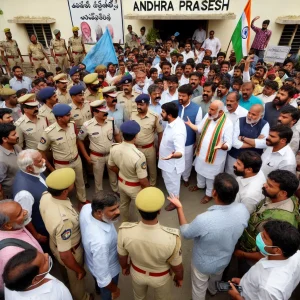
AMARAVATI – The political landscape in Andhra Pradesh has reached a boiling point as former Chief Minister Y.S. Jagan Mohan Reddy vehemently condemned the arrest of former YSR Congress Party (YSRCP) MLA Vallabhaneni Vamsi, accusing the ruling Telugu Desam Party (TDP) government of blatant misuse of power and orchestrating a campaign of political vendetta. In a scathing critique, Jagan asserted that the TDP-led coalition is resorting to unlawful arrests to silence dissent and intimidate political opponents.
Jagan’s allegations are not unfounded; he claims that the legal institutions in the state have been effectively paralyzed due to the TDP’s interference. He accused the ruling party of using the so-called “Red Book Constitution” as a cover for its oppressive tactics, aimed at undermining the democratic framework of Andhra Pradesh. The arrest of Vallabhaneni Vamsi, he argues, is a glaring example of this political vendetta.
The situation escalated further with revelations from the Gannavaram case, where a Dalit youth testified that TDP leaders pressured him into filing a false case. Jagan criticized TDP Chief Chandrababu Naidu for employing unethical tactics, attempting to manipulate investigations, and intimidating witnesses. He claimed that police have become mere instruments of political harassment, threatening and coercing individuals who dare to speak out against the ruling party.
Despite being under judicial scrutiny, Jagan contended that the TDP government continues to interfere in ongoing investigations, calling this conduct a serious affront to the judiciary. He held the government accountable for Vamsi’s safety and condemned what he characterized as politically motivated arrests.
The former Chief Minister also highlighted another troubling incident involving former Denduluru MLA Kotharu Abbaiya Chowdary, who was falsely charged under SC/ST laws. Jagan pointed out that video evidence exists showing a TDP MLA verbally abusing Chowdary’s driver, yet police chose to fabricate charges against Chowdary instead of addressing the actual offender. This blatant disregard for justice exemplifies what Jagan describes as a systematic targeting of political opponents by the TDP government.
In his criticism, Jagan did not shy away from addressing broader issues within the TDP administration. He accused Naidu’s government of failing to fulfill its promises to the electorate, including key initiatives like the Super-6 programs. Instead, he claimed that Naidu’s administration is attempting to distract from its failures through politically motivated arrests and fabricated cases against opposition leaders.
As tensions mount in Andhra Pradesh, Jagan’s warnings resonate with voters who are increasingly aware of these injustices. He asserted that the people will not forget these abuses of power and will hold the TDP government accountable in future elections. The ongoing conflict between the YSRCP and TDP raises critical questions about governance and accountability in a state grappling with political turmoil.
With each passing day, it becomes clearer that Andhra Pradesh is witnessing a dangerous trend where political vendetta threatens to overshadow governance and democratic principles. As both parties gear up for future confrontations, one can only wonder how this escalating conflict will shape the political landscape in Andhra Pradesh moving forward.




